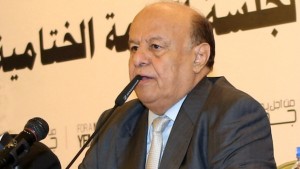Yemen Unrest: Saudi, Allies on Offensive Mode
In a strong, offensive move to militarily back the US-backed Yemeni President Abd Rabbuh Mansur Hadi , Saudi Arabia and its allies in the Gulf region have come out to the fore deploying troops and warplanes in Yemen to counter Iran allied forces who have beleaguered the southern city of Aden where the Yemani president had found asylum. The Gulf Broadcaster Al Arabiya TV reported that 150,000 military troops and 100 warplanes have already been dispatched across the region, and that Muslim countries including Egypt, Jordan, Sudan, and Pakistan expressed their readiness in joining the military campaign with Saudi Arabia.
However, the tension has escalated as Yemen’s Shia Houthi fighters have claimed that they have established a five member presidential council that is supposed to be ruling the country for the coming two years. The UN said that it would not concede the political claims made by the Houthi fighters, describing it as undemocratic, while the US government opined that the move by the Houthis has not met the standards set by the UN envoy to Yemen. Meanwhile, the Houthis, adamant in their claims of being a authoritative power in the country, now look towards witnessing a political centre of their own in Yemen.
Reuters reported that Middle East stock markets might remain strained as Soudi troops moved to Yeman, and that Saudi’s main index has fallen 5 percent on Wednesday. It also said that other Gulf markets have also fallen, pointing to the worries of investors in the region. However, it is expected that the political conflict in the region would not cause a long-term damage on the economic sectors of the Middle East due to the remoteness of Yeman and Gulf States’ entrenched security over their economic sectors.
, Saudi Arabia and its allies in the Gulf region have come out to the fore deploying troops and warplanes in Yemen to counter Iran allied forces who have beleaguered the southern city of Aden where the Yemani president had found asylum. The Gulf Broadcaster Al Arabiya TV reported that 150,000 military troops and 100 warplanes have already been dispatched across the region, and that Muslim countries including Egypt, Jordan, Sudan, and Pakistan expressed their readiness in joining the military campaign with Saudi Arabia.
However, the tension has escalated as Yemen’s Shia Houthi fighters have claimed that they have established a five member presidential council that is supposed to be ruling the country for the coming two years. The UN said that it would not concede the political claims made by the Houthi fighters, describing it as undemocratic, while the US government opined that the move by the Houthis has not met the standards set by the UN envoy to Yemen. Meanwhile, the Houthis, adamant in their claims of being a authoritative power in the country, now look towards witnessing a political centre of their own in Yemen.
Reuters reported that Middle East stock markets might remain strained as Soudi troops moved to Yeman, and that Saudi’s main index has fallen 5 percent on Wednesday. It also said that other Gulf markets have also fallen, pointing to the worries of investors in the region. However, it is expected that the political conflict in the region would not cause a long-term damage on the economic sectors of the Middle East due to the remoteness of Yeman and Gulf States’ entrenched security over their economic sectors.
In Yemen Power is vested in individuals, it is difficult to placate war-mongering groups which are now on the verge of taking control of the state. In this situation it is unlikely that a healthy political atmosphere would develop in the region. The Houthi-led takeover that caused the resignation of Yemen president has to be read in the context of political impasse that exists in Yemen for long .























Connect
Connect with us on the following social media platforms.